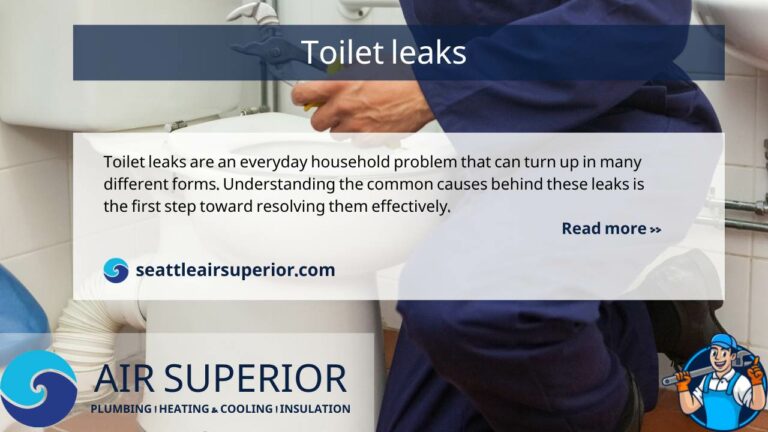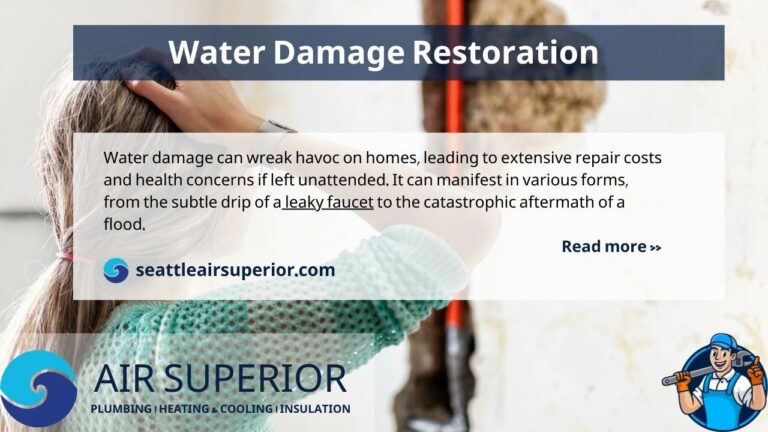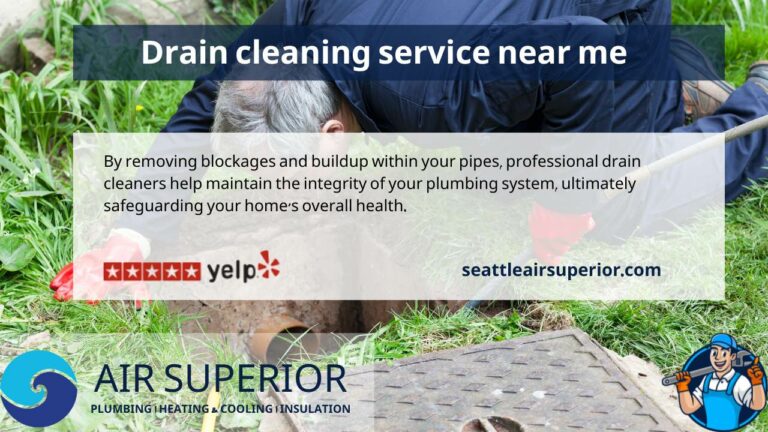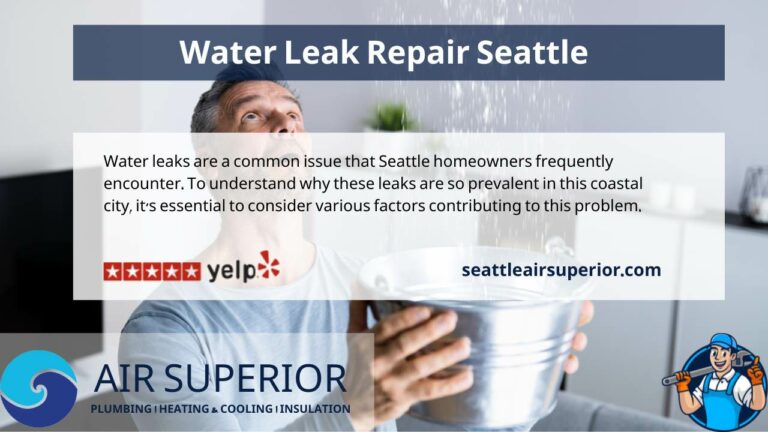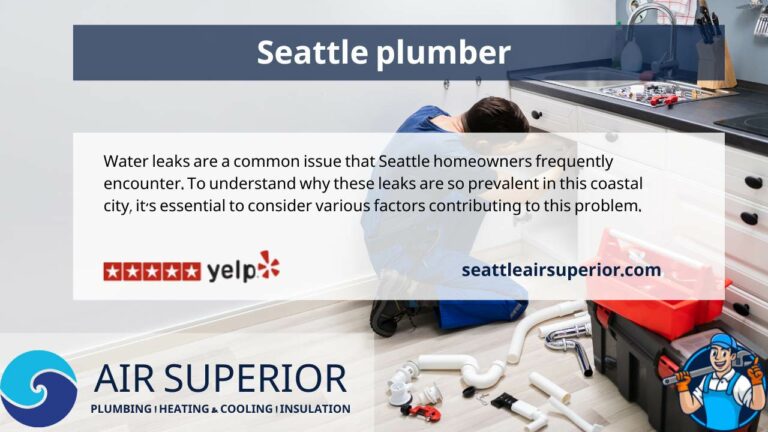Kitchen Sink Clogs: Why Do They Happen?
Kitchen sink clogs are a common household nuisance that can disrupt your daily routine. These blockages occur when debris and substances accumulate in your sink’s drainage system, preventing water from flowing freely down the pipes. Understanding why kitchen sink clogs happen is essential to effectively prevent and address them.
Looking for a nearby plumber for Clogged Sink the kitchen? | Click here >>
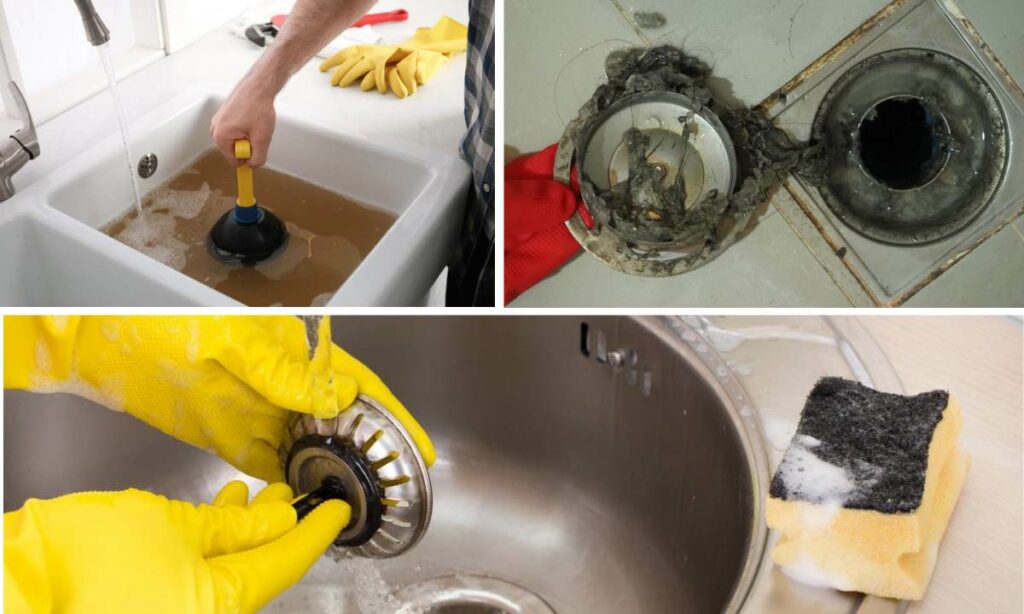
The Most Common Culprits of Kitchen Sink Blockages
Understanding the common culprits behind kitchen sink clogs is crucial in preventing them. Here are the top offenders responsible for these frustrating blockages:
- Food Residue – Leftover food particles, especially starchy foods like pasta and rice, can accumulate and cause clogs.
- Grease and Oils – Liquid grease and oils solidify in pipes, restricting water flow.
- Soap Scum – Soap residue binds with hard water minerals, creating a sticky pipe-coating substance.
- Coffee Grounds – Coffee grounds don’t break down easily and can lead to blockages.
- Foreign Objects – Accidentally dropped items, such as utensils or bottle caps, can obstruct drains.
- Hard Water Minerals – Mineral deposits from hard water can build up and narrow pipe passages.
Immediate Steps to Take When Your Sink Clogs
When you encounter a kitchen sink clog, it’s essential to act promptly to prevent further inconvenience and potential damage. Follow these steps to address the issue:
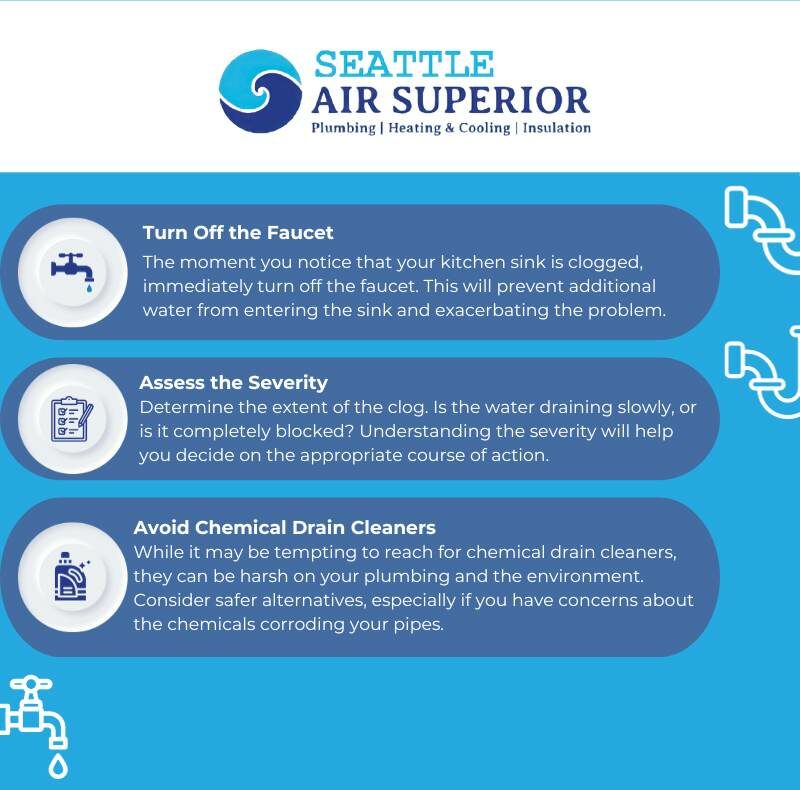
- Turn Off the Faucet – The moment you notice that your kitchen sink is clogged, immediately turn off the faucet. This will prevent additional water from entering the sink and exacerbating the problem.
- Assess the Severity – Determine the extent of the clog. Is the water draining slowly, or is it completely blocked? Understanding the severity will help you decide on the appropriate course of action.
- Avoid Chemical Drain Cleaners – While it may be tempting to reach for chemical drain cleaners, they can be harsh on your plumbing and the environment. Consider safer alternatives, especially if you have concerns about the chemicals corroding your pipes.
The Relationship Between Grease and Persistent Clogs
Grease is one of the most common culprits when it comes to persistent kitchen sink clogs. When hot grease is poured down the drain, it may flow easily at first, but as it cools, it solidifies and sticks to the pipes’ inner surfaces.
Accumulation Over Time – As more grease is poured down the drain, it accumulates, creating a thick, sticky layer. This not only narrows the passageway for water but also provides an ideal surface for other debris to attach to, worsening the clogging issue.
Natural Solutions: Unclogging Your Sink Without Chemicals
If you’re dealing with a kitchen sink clogged with natural or food-related debris, there are effective and eco-friendly methods to unclog it without resorting to harsh chemicals:
- Boiling Water – Pour boiling water down the drain to dislodge or soften clogs.
- Baking Soda and Vinegar – Use this mixture followed by hot water to break down clogs.
- Plunging – Use a sink plunger to clear blockages caused by food or debris.
- Manual Removal – Wear gloves and use tools like a plumbing snake to manually remove obstructions.
Factors Influencing the Price of Kitchen Sink Clog Removal
- Clog Severity – Severe clogs may require more time and effort to remove.
- Plumber Rates – Rates vary by location and experience.
- Clog Type – Different clogs may need different removal methods.
- Service Timing – Emergency or late-night service may cost more.
- Additional Repairs – Clogs can cause pipe damage, leading to extra costs.
- Prevention – Consider cost-effective preventive measures like regular drain cleaning.
Plunger Power: The Right Technique for Sink Clogs
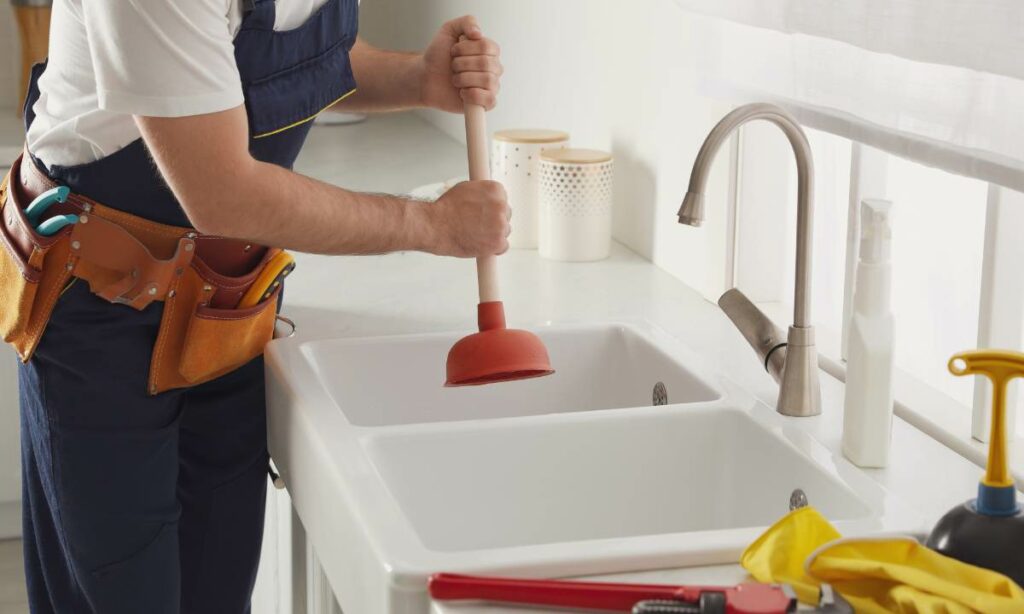
A plunger can be a powerful tool for addressing kitchen sink clogs when used correctly. Follow these steps for effective plunging:
- Select the Right Plunger – Use a sink plunger, also known as a cup plunger, with a flat bottom and a flange for a better seal.
- Fill the Sink – Add enough water to cover the plunger’s cup. This creates a better seal and enhances the plunging action.
- Position the Plunger – Place the plunger over the clogged drain, ensuring it covers the entire opening. Press down firmly to create a seal.
- Apply Pressure – Push and pull the plunger vigorously for about 20-30 seconds, maintaining a tight seal. The suction and pressure should dislodge the clog.
How Improper Garbage Disposal Use Can Lead to Clogs
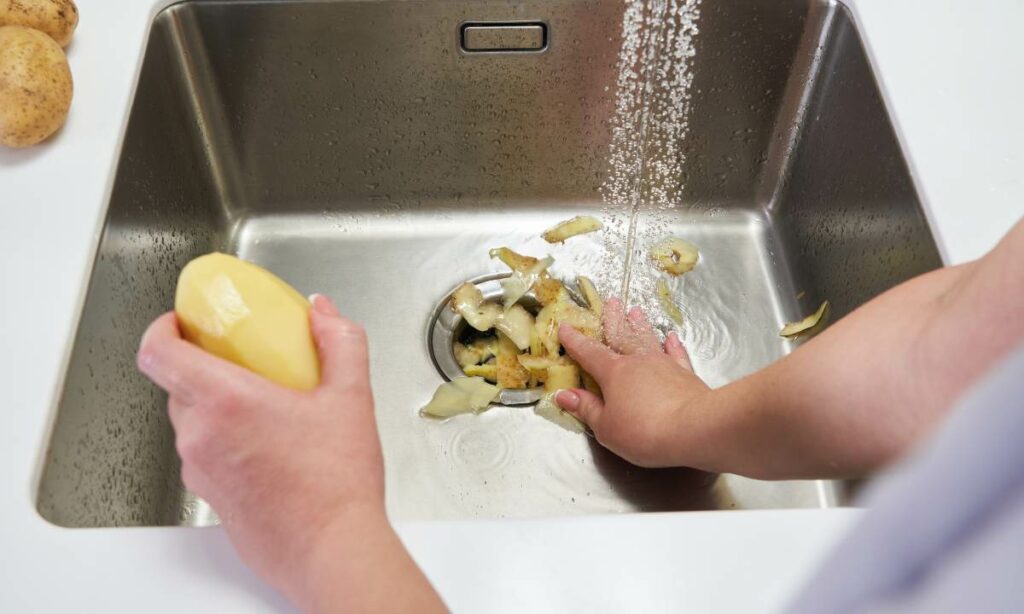
- Inadequate Grinding – Garbage disposals are designed to break down small food scraps, but they struggle with items like bones, fibrous vegetables, and coffee grounds. These items can accumulate and cause blockages.
- Lack of Water – Running cold water while using the garbage disposal helps flush ground-up food particles down the drain. Without sufficient water, these particles can stick to the pipes and build up.
- Overloading – Overloading the disposal with too much food at once can overwhelm its capacity, leading to inefficient grinding and potential clogs.
- Non-Food Items – Never put non-food items, like plastic, glass, or metal, into the garbage disposal, as they can damage the appliance and create clogs.
The Role of Soap Scum in Blocking Kitchen Sinks
Soap scum might seem harmless, but it can play a significant role in kitchen sink clogged. Here’s how:
- Formation of Soap Scum – Soap scum forms when soap interacts with minerals present in hard water. The resulting substance is sticky and can adhere to the walls of your sink’s pipes.
- Debris Attraction – Once soap scum has formed, it becomes an excellent magnet for other debris, such as food particles and grease, which can become trapped and accumulate within the pipes.
- Reduced Drainage – Over time, the combination of soap scum and trapped debris can constrict the flow of water, leading to a clogged kitchen sink.
Professional Tools: How Plumbers Tackle Tough Clogs
When kitchen sink clogs prove stubborn or severe, professional plumbers employ a range of specialized tools and techniques to address the issue:
- Augers and Snakes – Plumbers use these flexible tools to reach deep into the pipes, break up clogs, and pull out obstructions.
- Hydro-Jetting – High-pressure water is employed to forcefully clear clogs and flush out debris, including grease and mineral buildup.
- Video Inspection – Plumbers often use cameras to inspect the interior of the pipes, allowing them to pinpoint the exact location and nature of the clog.
- Pipe Replacement – In extreme cases where pipes are severely damaged or corroded, plumbers may recommend and carry out pipe replacements.
- Maintenance Plans – Many plumbing services offer preventive maintenance plans that include regular inspections and cleaning to minimize the risk of future kitchen sink clogs.
When to Call Seattleairsuperior for a Clogged Kitchen Sink
Knowing when to seek professional like SeattleAirSuperior can help for a clogged kitchen sink is crucial to prevent further damage. Consider these scenarios as signs it’s time to call a professional plumber:
- Persistent Clogs – If your sink remains clogged despite attempting DIY solutions, it’s time to enlist professional assistance to address the underlying issue.
- Foul Odors – Unpleasant odors emanating from the sink can indicate a more severe clog or a drainage problem that requires professional attention.
- Slow Drainage – If water drains noticeably slower than usual, it may signal an impending clog. Calling a plumber early can prevent a complete blockage.
- Multiple Clogged Fixtures – If several plumbing fixtures in your home are having drainage problems at the same time, it could suggest a more substantial issue within your plumbing system.
- Preventive Maintenance – Regularly scheduling professional drain cleaning can help prevent clogs and maintain optimal sink functionality.
DIY: Simple Tools and Techniques to Clear Blockages
While professional plumbers have their arsenal of tools, you can tackle many kitchen sink clogs with DIY methods. Here are some simple tools and techniques to consider:
- Plunger – Use a sink plunger for minor clogs with a good seal.
- Baking Soda and Vinegar – Natural remedy followed by hot water.
- Plumbing Snake or Wire Hanger – Reach and remove stubborn clogs.
- Boiling Water – Quick fix for grease or soap residue clogs.
- DIY Drain Cleaner – Mix baking soda, salt, and hot water.
- Safety First – Wear gloves and use caution with DIY solutions.
Maintenance Tips to Prevent Future Kitchen Sink Clogs
Prevention is key when it comes to kitchen sink clogs. Here are some maintenance tips to help you keep your sink free from blockages:
- Use Sink Strainers – Placing sink strainers in the drain can catch food particles and debris before they enter the pipes, reducing the risk of clogs.
- Proper Disposal – Dispose of food scraps, oils, and grease in a designated container or trash bin rather than down the drain.
- Regular Cleaning – Periodically clean your sink’s drainage system by using natural methods like baking soda and vinegar or professional drain cleaning services.
- Hot Water Flushing – Regularly pour boiling water down the drain to help dissolve minor buildups and maintain a clear pipe.
- Avoid Harsh Chemicals – Steer clear of chemical drain cleaners, as they can damage pipes and harm the environment.
Understanding the Impact of Hard Water on Sink Clogs
Hard water, containing high levels of minerals like calcium and magnesium, can contribute to kitchen sink clogged. Mineral Deposits – Over time, these minerals can accumulate on the interior of your pipes, creating a rough surface that traps debris and contributes to clogs.
The Importance of Regular Drain Cleaning in the Kitchen
Regular drain cleaning is a proactive measure that can significantly reduce the occurrence of kitchen sink clogs. Here’s why it’s essential:
- Preventive Maintenance – Routine drain cleaning helps remove built-up debris, grease, and mineral deposits before they can lead to clogs.
- Improved Drainage – Clean pipes allow water to flow freely, preventing slow drainage and backups that can disrupt your daily activities.
- Extended Lifespan – Regular maintenance can prolong the lifespan of your plumbing system, reducing the need for costly repairs or replacements.
- Reduced Odors – Drain cleaning can help eliminate foul odors caused by trapped debris or stagnant water in your pipes.
Safety Precautions: Working with Chemical Drain Cleaners
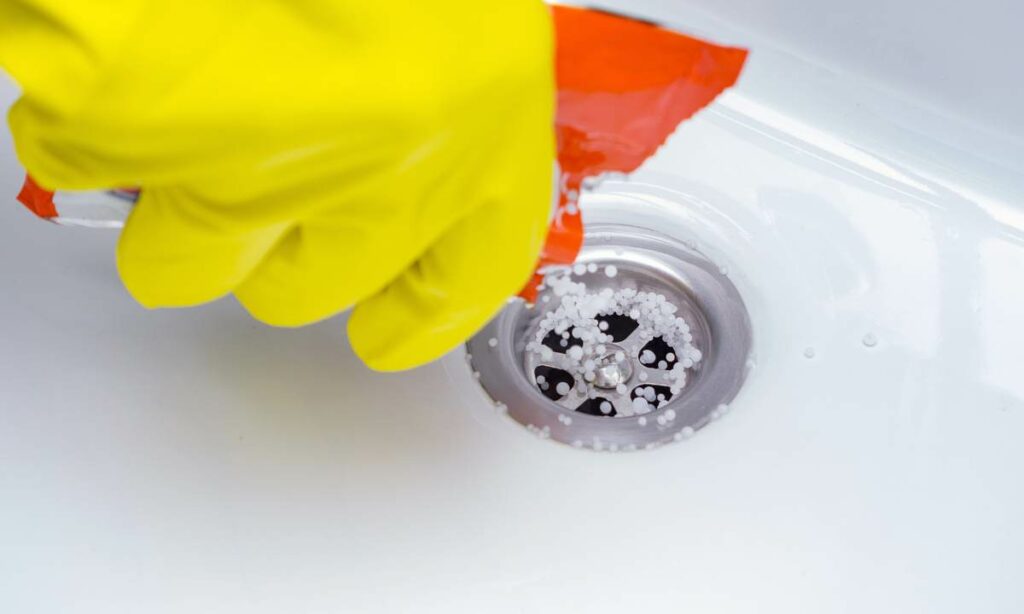
While chemical drain cleaners can be effective, they come with safety concerns that must not be ignored when dealing with kitchen sinks clogged:
- Protective Gear – Always wear appropriate protective gear, including gloves and eye protection, when handling chemical drain cleaners.
- Ventilation – Ensure adequate ventilation in the area when using chemical cleaners to avoid inhaling potentially harmful fumes.
- Read Labels – Carefully read and follow the instructions and warnings on the product label, as different drain cleaners have varying safety precautions.
- Avoid Mixing Products – Never mix different types of drain cleaners or chemicals, as this can result in dangerous reactions.





